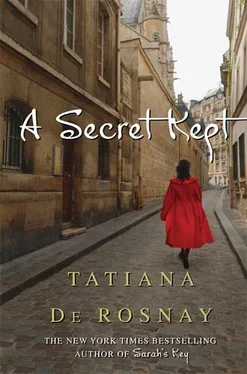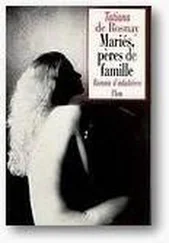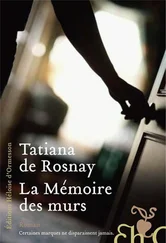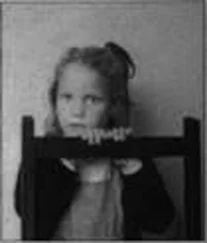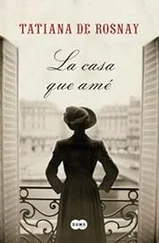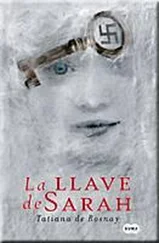Valérie looks upset. In the past couple of days I have become used to Mélanie’s state and have to keep reminding myself that the first time is inevitably a shock. I reach out and take her hand.
“She looks so fragile,” she whispers.
“Yes,” I say, “but she is looking better than she did on the first day.”
“You’re not hiding anything from me, are you?” she asks sharply.
“What do you mean?”
“Well, like is she going to be paralyzed-or something hideous?”
“Of course not. But the truth is, the doctor is not telling me much. I have no idea how long Mel is going to have to stay here, when she is going to be up on her feet again.”
Valérie scratches the top of her head. “We saw her doctor while she was in there. Nice woman, I thought.”
“Yes, she is.”
She turns to look at me. “What about you, Tonio? How are you bearing up?”
I smile and shrug. “I feel like I’m in a sort of daze.”
“It must have been awful, especially after such a nice weekend. I spoke to Mel on her birthday. She sounded like you were having a great time.”
“Yes,” I said lamely, “we were.”
“I keep wondering why this happened.”
She looks at me again. I don’t know what to answer, so I look away.
I finally sigh. “She just drove off the road, Valérie. That’s all there is to it. That’s how it happened.”
She puts a tanned arm around me. “Tell you what, why don’t you let me stay here a couple of days. You can drive up with Marc to Paris and I’ll stay and look after Mel for a while.”
I toy with the idea in silence.
She goes on: “There’s nothing much for you to do here for the moment. She can’t be moved, so why don’t you go back home, let me take over, and we’ll see how it goes. You need to get back to your job, see your kids over the weekend, and then you can come back with your dad, for instance.”
“I feel bad leaving her.”
She scoffs. “Oh, come on. I’m her oldest, closest friend. I’m doing this for her, and for you too. For both of you.”
I squeeze her arm. I pause. Then I say, “Valérie, do you remember my mother?”
“Your mother?”
“You’ve been friends with Mel for so long, I thought maybe you remembered her.”
“We met just after she died. We were eight, I think. I do recall my parents telling me I should never ask Mel about it. But Mel showed me photos of her, letters, little things that belonged to her. And then your father remarried. And then we grew into frivolous teenagers, and we became interested in boys and all that. We didn’t talk about your mother much. But I felt so sorry for both of you. You were the only children I knew whose mother had died. It made me feel guilty and sad.”
Guilty and sad. I remember friends at school acting that way too. Some friends were so shocked that they couldn’t talk to me normally anymore. They ignored me or blushed when I spoke to them. The headmistress had made an awkward speech, I remember, and there had been a special Mass for Clarisse. The teachers were all very nice to me for a couple of months. I became the boy whose mother died. Whispers behind my back, nudges, the thrust of chins. Look, that’s him, his mother died.
I see Marc coming back with the little girl and the dog. I know I can trust Valérie to look after my sister. She explains that she has a bag with her stuff, she can stay for a couple of days, it is easy and necessary, and she wants to do it.
So I make up my mind quite quickly. I decide to leave with Marc, Rose, and Léa. I just need time to pack, tell the hotel that Valérie will be needing a room, and say goodbye to my sister, who is so happy to see her best friend that she doesn’t seem upset by my taking off.
I hover outside what I believe is Angèle’s office, hoping to catch her. She doesn’t seem to be around. I think about what she is doing right now, what corpse she is attending to at that very moment. As I step away, I see Dr. Besson and explain to her that I will be leaving my sister in the care of a close friend and that I will soon be back.
She reassures me, tells me Mélanie will be in the best of hands, and then she has this strange sentence.
“Keep an eye out for your father.”
I nod and walk away, but I can’t help wondering what she means. Does she think my father looks ill? Did she notice something I didn’t? I have half a mind to turn back and ask her to explain, but Marc is waiting for me and the child has already begun to make a fuss, so we take off fast, waving to Valérie’s tall, comforting figure at the hospital entrance.
The drive is long and hot but miraculously quiet, as both dog and child fall asleep. Marc is the silent type. We listen to classical music and don’t engage in much talking, which I feel relieved about.
The first thing I do when I get home is to fling open all the windows. The rooms are stuffy and stale. Paris has that dusty, heavy, broiling summer smell, laden with exhaust fumes and dog shit. The noisy rue Froidevaux, three floors down, spews up its incessant roar of traffic. I can never leave the windows open long, the noise is too horrendous.
The fridge is empty. I can’t face the idea of a lonely meal. I call Emmanuel, get his answering machine, beg him to cross teeming-hot, jammed Paris all the way from the Marais to give me some moral support and company over dinner, which he will no doubt end up making. My phone beeps a few minutes later, and I expect a text message from Emmanuel. But no.
That’s called taking French leave. When are you back?
My blood races around my chest, making me even sweatier. Angèle Rouvatier. I can’t help grinning. I cradle the phone in my hand like a sentimental teenager. I text back fast:
I miss you. Will call you soon.
I immediately feel foolish. Should I have sent that? Should I have admitted I miss her? I rush down to the Monoprix on the avenue du Général Leclerc and buy wine, cheese, ham, and bread. The phone beeps again as I leave the shop. It’s Emmanuel texting to say he is on his way.
As I wait for him, I choose an old Aretha Franklin CD and turn it up loud. The old lady above is stone deaf, and the couple below are still on vacation. I pour myself a glass of Chardonnay and walk through my empty apartment, humming along to “Think.” My children will be turning up this weekend. I peer into their rooms. Once the divorce was in full swing, they liked the idea of having rooms in two different houses, I remember. That helped. I let them decorate each room their own special way. Lucas’s walls are plastered with Jedi and Darth Vaders. Arno painted his dark blue, which looks incongruously aquatic. Margaux pinned up a poster of Marilyn Manson at his worst. I look at it only if I have to. There is another upsetting photograph of Margaux and Pauline, her best friend, both heavily made up and exhibiting their middle fingers. My cleaning lady, the energetic and talkative Mme Georges, complains about the state of Arno’s room. She says she can’t get the door open, there’s so much stuff lying around on the floor. Margaux’s is just as bad. Only Lucas makes a small effort at cleaning things up. I let them live with their mess. They spend so little time with me, and the idea of telling them to clean up again and again does not appeal to me at all. I leave that to Astrid. And to Serge.
I notice that Lucas has a family tree above his desk. I’d never seen it. I put my wineglass down to have a look. Astrid’s parents, French on one side, Swedish on the other, going back to her grandparents. On our side, the Rey family, and a question mark beside my father’s photograph. I realize that Lucas knows very little about my mother. I even wonder if he knows her name. What have I told my children about her? Hardly anything.
Читать дальше
